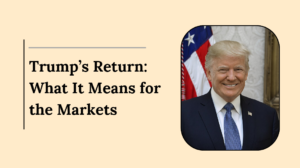Introduction
The Indian 2024 general elections have concluded, leaving investors pondering the implications for their stock portfolios. With the NDA government returning to power in a coalition, the stock market witnessed a 6% correction, reflecting initial shock and disappointment among investors who had anticipated a different outcome based on exit polls. The shift in power dynamics raises concerns about potential instability, with coalition politics reintroducing an element of unpredictability to governance.
Source: https://results.eci.gov.in/PcResultGenJune2024/index.htm
Key Considerations Amidst Post-Election Turbulence
Amidst Post-Election Turbulence, here are key considerations to keep in mind:
Focus on Long-Term Strategies
Amidst market volatility, maintaining focus on long-term investment strategies is paramount. Short-term fluctuations may test investor patience, but adherence to fundamental principles can mitigate knee-jerk reactions to market movements.
While market volatility may intensify in the near term, it’s crucial to remember that such fluctuations are inherent in stock market cycles, especially following periods of rapid growth.
You May Like: Are Indian Renewable Energy Stocks the Next Jackpot For Investors?
Understanding Market Sentiment
The interplay between bullish and bearish sentiments often exacerbates market volatility in the short term. However, underlying economic fundamentals tend to drive long-term market trends, highlighting the importance of staying grounded amidst market fluctuations.
Moreover, the resilience of the Indian stock market is closely tied to retail investor sentiment. Despite short-term uncertainties, continued retail engagement reinforces market resilience and dampens the likelihood of significant downturns.
Retail Investor Sentiment
Retail investor participation plays a pivotal role in sustaining market momentum. Despite short-term uncertainties, continued retail engagement reinforces market resilience and dampens the likelihood of significant downturns.
Market valuations also warrant attention, with indicators such as the Nifty PE ratio and the Smallcap to Sensex ratio providing insights into market sentiment and potential risks. While the Nifty PE ratio remains within a reasonable range, caution is advised concerning smallcap valuations, which appear stretched compared to historical medians.
Looking Ahead
Looking ahead, investors can take comfort in India’s trajectory of economic progress, which has remained resilient across political transitions. Since the liberalization of the economy in 1991, successive governments have pursued progressive policies aimed at fostering growth and development. This trend is expected to continue, driven by the imperative of addressing the aspirations of India’s burgeoning youth population.
Ultimately, investors are encouraged to adopt a long-term perspective and remain focused on fundamental investment principles. Rather than being swayed by short-term market fluctuations or political developments, prudent investment decisions should be guided by an understanding of economic fundamentals and a commitment to long-term wealth creation.
You May like: Is Investing in Indian AI Stocks the Next Big Opportunity?
Conclusion
In conclusion, while election results may introduce short-term volatility, the underlying strength of the Indian economy and the commitment to progressive policies provide a solid foundation for investors. By staying the course and adhering to disciplined investment strategies, investors can navigate through market turbulence and capitalize on long-term growth opportunities.
Disclaimer: The information provided in this article is for educational and informational purposes only and should not be construed as investment advice. Readers are advised to conduct their own research and consult with a qualified financial advisor before making investment decisions.











